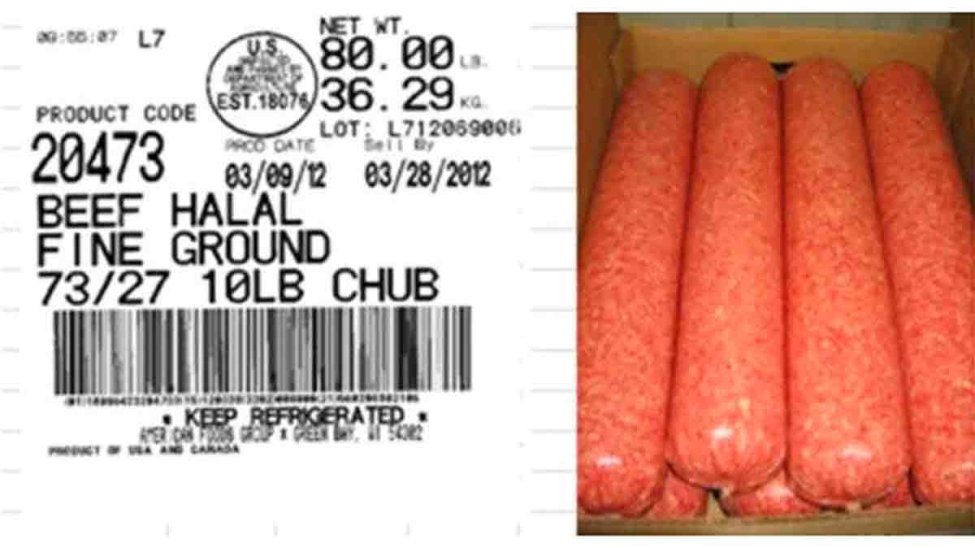More than 58,000 pounds of ground beef recalled due to possible E. coli contamination

In a concerning development, over 58,000 pounds of ground beef products have been recalled due to the potential presence of E. coli. This recall, initiated by American Foods Group, has raised alarms within the food industry and among consumers. In this article, we will delve into the details of this recall, the affected products, and what steps consumers should take to ensure their safety.
ADVERTISEMENT
The Recall Announcement
On September 15, 2023, the U.S. Department of Agriculture (USDA) issued a bulletin on its website, notifying the public of the recall. The recall encompasses approximately 58,281 pounds of ground beef products produced by American Foods Group, a Wisconsin-based company. The trigger for this recall was the detection of Shiga toxin-producing E. coli (STEC) in a sample batch of beef. The contaminated products were manufactured on August 14, 2023, and distributed to wholesalers in Georgia, Michigan, and Ohio.
ADVERTISEMENT
American Foods Group, which operates under the name Green Bay Dressed Beef, has yet to provide a statement regarding this recall.
ADVERTISEMENT
No Reported Reactions
While the recall is indeed troubling, it’s essential to note that as of now, there have been no confirmed reports of adverse reactions linked to the consumption of these products. Nevertheless, the recall serves as a precautionary measure to ensure public safety.
Identifying the Recalled Products
Products subject to the recall bear establishment numbers within the USDA mark of inspection, specifically labeled as “EST. 18076.” These products are primarily packaged in 10-pound plastic tubes or chub packs, typically used for sausages and hamburgers. The following products are part of the recall:
- “90050 BEEF FINE GROUND 81/19” with lot code D123226026.
- “20473 BEEF HALAL FINE GROUND 73/27” with lot code D123226027.
- “20105 BEEF FINE GROUND 73/27” with lot code D123226027.

What to Do If You Have a Recalled Product
If you possess any of the products listed above, it is crucial to take immediate action to safeguard your health. The USDA advises distributors and other customers who have purchased these impacted products to either dispose of them or return them to the vendors from whom they were purchased.
For consumers with questions or concerns regarding the recall, they can reach out to the American Foods Group LLC’s Vice President of Marketing and Communications at 1-800-829-2838 or via email at info@americanfoodsgroup.com. Additionally, the USDA Meat and Poultry Hotline is available for inquiries and can be reached toll-free at 888-MPHotline (888-674-6854) or via email at MPHotline@usda.gov.
Understanding the Impact of Foodborne Diseases
Foodborne diseases are a significant public health concern, with approximately 3,000 Americans succumbing to them annually, according to the Centers for Disease Control and Prevention (CDC). These diseases affect nearly 1 in 6 Americans each year, causing substantial health risks.
E. coli (STEC) O157 is one of the pathogens responsible for a considerable number of hospitalizations in the United States. Alongside Norovirus, salmonella, Campylobacter spp, and Toxoplasma gondii, it ranks among the top five pathogens causing hospitalizations.
Shiga Toxin-Producing E. coli (STEC)
Shiga toxin-producing E. coli is a term used to describe different strains of E. coli that can cause illness by producing Shiga toxin, a potent biological poison. The CDC emphasizes that seniors and young children are particularly susceptible to severe illness resulting from an STEC infection. Symptoms can persist for three to eight days, and individuals infected with STEC O103 may experience vomiting and bloody diarrhea, as highlighted in the USDA’s announcement regarding the September 15 raw beef recall.
A Heartbreaking Reminder
E. coli-related incidents are not just statistics; they have real and tragic consequences. Riley Detwiler, a child who lost his life to E. coli poisoning in February 1993 at just 16 months old, serves as a poignant reminder of the devastating impact of foodborne diseases. Riley contracted the bacteria while at his daycare after interacting with another child who had consumed contaminated hamburgers. On the 30th anniversary of his passing, Riley’s father, Darin Detwiler, shared his journey to combat and raise awareness of foodborne diseases on TODAY.com.
Symptoms of E. coli Infection
E. coli (Escherichia coli) typically resides in the intestines of both humans and animals, aiding in the digestion process. However, when specific strains produce toxins, it can lead to a range of symptoms, including non-bloody and bloody diarrhea, vomiting, and stomach aches and cramps, as detailed by the Cleveland Clinic.
Contagious Nature of E. coli
E. coli is highly contagious and can spread from person to person, primarily when individuals fail to practice proper hand hygiene. Contamination can also occur through consumption of tainted water and food. Vulnerable populations, such as seniors, young children, and individuals with weakened immune systems, face a higher risk of falling ill after exposure to the bacteria, according to the Mayo Clinic.
The recall of over 58,000 pounds of ground beef products due to potential E. coli contamination is a stark reminder of the importance of food safety. Consumers must remain vigilant and take the necessary steps to protect themselves and their families. By promptly disposing of or returning recalled products and practicing good hygiene, we can mitigate the risk posed by foodborne diseases.




